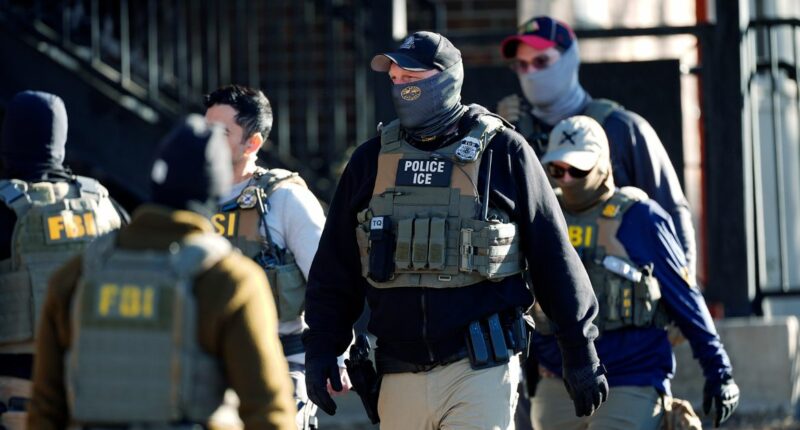Share this @internewscast.com
FILE – Law officials spread out through an apartment complex during a raid, Feb. 5, 2025, in east Denver (AP Photo/David Zalubowski, File).
A federal judge has determined that Immigration and Customs Enforcement (ICE) officers have engaged in unlawful practices during their arrests of suspected illegal immigrants in Colorado.
In a comprehensive 66-page ruling released on Tuesday, U.S. District Judge R. Brooke Jackson criticized ICE for conducting warrantless arrests without establishing probable cause of potential flight risk. His decision favored four individuals who, despite residing in the U.S. illegally, have established “deep and longstanding ties to their communities.”
Judge Jackson asserted, “No reasonable officer could have reasonably concluded that these plaintiffs were likely to flee before a warrant could be obtained.” He further noted, “Yet ICE nonetheless arrested each one immediately and detained them for significant periods, causing severe hardship and loss.”
Appointed by Barack Obama, Jackson emphasized, “Mere presence within the United States in violation of United States immigration law is not, by itself, sufficient to conclude that a person is likely to escape before a warrant for arrest can be obtained.”
The four individuals, represented by the American Civil Liberties Union (ACLU), had filed a lawsuit last month. They argued that ICE agents in Colorado were “indiscriminately stopping and arresting people” based on racial profiling to meet the administration’s heightened enforcement objectives. Their case highlighted that ICE lacked the authority to carry out warrantless arrests and hold individuals without solid evidence of flight risk.
The Trump administration countered by asserting that warrants for the arrests were obtained post-factum. However, Judge Jackson found this defense insufficient and unpersuasive.
“Under the defendants’ reasoning, ICE could simply stop any suspected undocumented person, conduct a warrantless arrest with no probable cause of flight risk, and then bring the arrest within the color of law by issuing a warrant at the field office,” he wrote, finding that such a view violates the law.
Jackson ultimately sided with the plaintiffs that they have likely been harmed by ICE’s actions. “Although none of them presented a flight risk by any reasonable measure, they were each arrested and detained without warning, ultimately spending between approximately two weeks and three months in custody,” the judge wrote, finding that a preliminary injunction to stop the arrests without probable cause was warranted.
He pointed to the administration’s actions at large as evidence why such a decision is necessary.
“ICE has almost doubled its headcount in Colorado this year alone, is actively recruiting and hiring many more officers, and plans to open three additional detention centers in Colorado, nearly tripling its current capacity,” he wrote. “On this record, plaintiffs have shown that, without the requested injunction, there is likely to be a substantial increase in the number of warrantless arrests made without probable cause of flight risk.”
The judge also found that the plaintiffs can represent a class of all individuals who have been arrested since Jan. 20, the day the current Trump administration began, “or will be arrested in this District by ICE without a warrant and without a pre-arrest, individualized assessment of probable cause that the person poses a flight risk.”
The plaintiffs were also likely harmed because of the financial “burdens” placed on them due to the arrests and subsequent bonds they had to pay, Jackson found. Because of this, the administration has been ordered to repay them for their posted bonds.
Immigrant rights groups celebrated the judge’s decision, with the ACLU of Colorado writing that the court “confirmed what has been enshrined in federal law for decades: ICE cannot terrify our communities with their haphazard warrantless arrests.”
“A federal court has now declared that ICE must immediately stop these aggressive and unlawful tactics,” Tim Macdonald, ACLU of Colorado legal director, added.
The Department of Homeland Security (DHS), which oversees ICE, indicated that it would appeal the ruling.
“This activist ruling is a brazen effort to hamstring the Trump administration from fulfilling the President’s mandate to deport the worst of the worst criminal illegal aliens,” said the statement attributed to Tricia McLaughlin, DHS assistant secretary for public affairs, per Colorado Public Radio.

















